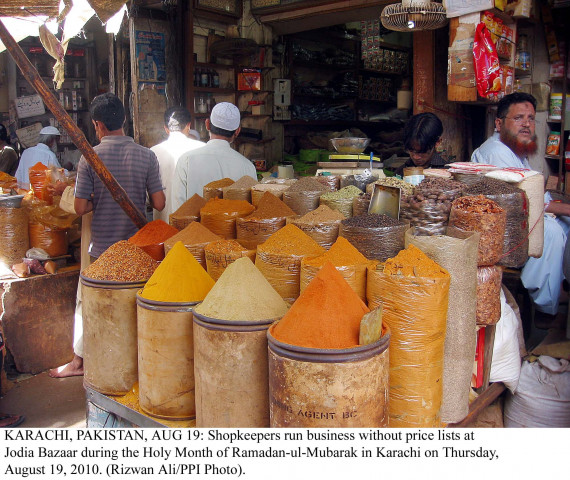Jodia Bazaar: A peek into growing undocumented trade
Many smuggled and expired products are sold unchecked in the market.

Despite all the hustle and bustle, every other trader here complains about declining sales – everyone from the rice wholesaler who records transactions of millions a day to a small vendor. PHOTO: PPI
Stepping on to the Murad Khan Road, amid the confusion, shouts and shoves, it might take a while for an outsider to discern the chaos of one of the largest markets in Pakistan. But from here onwards, everything falls into a pattern.
At the entry point to the Jodia Bazaar, an Afghan refugee in his 60s lures customers to his pushcart, which is laden with bottles of shampoo, face wash, detergent and deodorant selling at more than half the usual prices.
Besides him is another merchant displaying stationery – everything from rip-offs of expensive fountain pens wrapped in fancy boxes to diaries.
As one manoeuvres deeper inside, the same picture emerges, telling the story of Pakistan’s expanding undocumented trade.
“It’s very easy to understand why this is so cheap. None of this is taxed,” said the Afghan refugee, grinning and waving his hand over Head & Shoulders, Lux and Dove soaps and Axe, the trendy body spray for men.
“That is why the price is so low. But this is all genuine, you can have my word on this.”
He even offers an explanation to support his argument. “Look, you must have heard about cars being so cheap in Afghanistan. That big one can cost Rs1.7 million in Pakistan,” he says pointing towards a Toyota Corolla. “But we get it just for Rs0.6 million from across the border. That’s because there is no tax. Even I have one in my home.”
What he doesn’t mention is that all of this stuff is smuggled into the country, most of it coming from the Karachi Port located just a stone’s throw from here, rather than from the treacherous mountain paths along the Durand Line.
Also not mentioned is the fact that most of the goods are expired and many of the shampoos and soaps are actually harmful. No government officer comes here to check the quality or see the documents.
Retailers from across the city are likely selling the same products to unsuspecting people in impoverished areas like Landhi, New Karachi and Korangi.

There are wholesale shops, which sell Chinese diapers wrapped in Swedish packaging, which has been printed in Karachi – way cheaper than Pampers and other international brands.
Cleaning product
Nearby, another vendor is shouting out to customers. His tiny stall is also brimming with items of daily use, especially Scotch-Brite pot scrubbers made by 3M in the US.
“This is local stuff but does the same amount of cleaning. You can have a packet for Rs10,” he says. “In the market, the original product sells for Rs20.”
For years, multinationals including Unilever, Procter & Gamble and Colgate-Palmolive have campaigned against counterfeit products. But the influx of goods destined for Afghanistan that find its way into Jodia Bazaar has made it nearly impossible to stop the trade.
Even high-end retailers come here to buy imported things. Large stores are one-stop places for personal care goods the multinationals do not market in Pakistan.
Chocolates
Then there is the pleasant smell of cocoa that fills the crammed alley where daily-wage labourers, their shirts soaked in sweat, pull trolleys under the blue winter sky.
Flies swarm over 100kg lumps of chocolate put on stalls. “We buy this from a local company. All of this is fresh. This is the stuff they have to discard but it’s all edible,” said the vendor, as he hammered a chunk into smaller pieces.
Why would one of the largest confectionery manufacturers pass on its toffee raw material to these traders remains unclear.
Keen readers
The fallout of technological advancement can also be felt here. The spread of internet has actually forced some businessmen to consider changing their old ways of doing business.
The bazaar has been popular among avid readers who want to buy cheap foreign news magazines such as the Economist and specialised publications like the Harvard Business Review.
“I have seen a substantial decline in the number of customers over the last three, four years,” said one of the traders who buys old magazines and newspapers in bulk.
“And that’s basically because of the internet. It is so easy to use different software to download all of this stuff.”
Regular customers
The only regular customers are medical students and those aspiring to become furniture designers. “Books and publications on these subjects are not easily available on the internet, I guess.”
Despite all the hustle and bustle, every other trader here complains about declining sales – everyone from the rice wholesaler who records transactions of millions a day to a small vendor.
So by the time one walks out of the market, there are more questions than answers. But there is also an intense urge to come back the next day. After all, the deodorants were really inexpensive and no one is likely to tell the difference.
The writer is a staff correspondent
Published in The Express Tribune, February 9th, 2015.
Like Business on Facebook, follow @TribuneBiz on Twitter to stay informed and join in the conversation.


















COMMENTS
Comments are moderated and generally will be posted if they are on-topic and not abusive.
For more information, please see our Comments FAQ